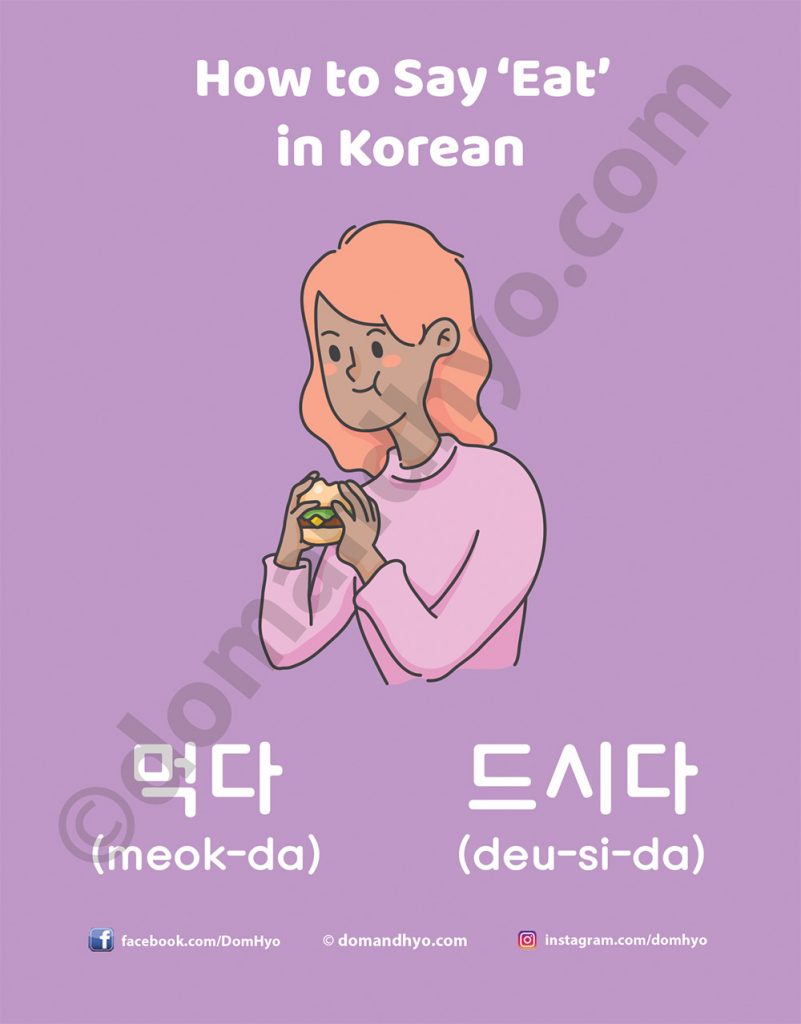
If it’s one thing you should know about Korean culture, it’s that eating is a big part of it. It’s a communal thing for people to enjoy and even eating alone is seen as something weird to do (although this is changing and more and more people don’t care about eating alone).
You can even ask how someone is doing by simply asking “Have you eaten yet?” (밥 먹었어?). Today, we will show you the many ways to say ‘eat’ in Korean.
먹다 (meok-da) = to eat
This is the most basic and common verb for eating. You will probably hear this one the most often. You can use this word with people you know, towards people younger than you, and to family. Hopefully, it’s fairly easy for you to remember. Let’s look at the basic conjugations (declarative with Romanization) for this verb.
Present tense
먹어 (chu-weo) [informal] = I eat.
먹어요 (chu-weo-yo) [standard polite] = I eat.
먹습니다 (chup-seum-ni-da) [formal] = I eat.
Past Tense
먹었어 (meo-geo-sseo) [informal] = I ate.
먹었어요 (meo-geo-sseo-yo) [standard polite] = I ate.
먹었습니다 (meo-geo-sseum-ni-da) [formal] = I ate.
Future Tense
먹을 거야 (meo-geul geo-ya) [informal] = I will eat.
먹을 거예요 (meo-geul geo-ye-yo) [standard polite] = I will eat.
먹을 겁니다 (meo-geul geom-ni-da) [formal] = I will eat.
Imperative
먹어 (meo-geo) [informal] = Eat it.
먹으세요 (meo-geu-se-yo) [standard polite] = Eat it.
먹으십시오 (meo-geu-sip-si-o) [formal] = Eat it.
And finally, here are some example sentences for 먹다:
너 야채 다 먹어. (neo ya-chae da meo-geo) = Eat all of your vegetables.
한 번 먹어봐요. (han beon meo-geo-bwa-yo) = Try eating it once.
이거 왜 먹어? (i-geo wae meo-geo) = Why would you eat that?
밥 얼른 먹어요. (bab eol-leun meo-geo-yo) = Hurry up and eat.
Got it! Great! Now let’s move on toe some formal ways to say ‘eat’ in Korean.
드시다 (deu-si-da) = to eat
This second way of saying eat is the honorific form. You would use it as a sign of respect towards your boss, higher-ups, elders, and people older than you in general (unless they give you permission to use 반말).
A common phrase using this verb is ‘맛있게 드세요!’ which is the formal way to say ‘Enjoy your meal!’
Let’s take a look at the basic conjugations for this form (declarative and imperative). *Site note, since this verb is already formal, don’t use the informal conjugations. we are showing them to you just for info purposes.*
Present tense
드셔 (deu-syeo) [informal] = I eat. 
드셔요 (deu-syeo-yo) [standard polite] = I eat.
드십니다 (deu-sim-ni-da) [formal] = I eat.
Past Tense
드셨어 (deu-syeo-sseo) [informal] = I ate. 
드셨어요 (deu-syeo-sseo-yo) [standard polite] = I ate.
드셨습니다 (deu-syeo-sseum-ni-da) [formal] = I ate.
Future Tense
드실 거야 (deu-sil geo-ya) [informal] = I will eat. 
드실 거예요 (deu-sil geo-ye-yo) [standard polite] = I will eat.
드실 겁니다 (deu-sil geom-ni-da) [formal] = I will eat.
Imperative
드셔 (deu-syeo) [informal] = Eat it. 
드시세요 (deu-si-se-yo) [standard polite] = Eat it.
드시십시오 (deu-si-sip-si-o) [formal] = Eat it.
And here are some example sentences for this verb:
피시 앤 칩스 드셔보세요. (pi-si aen chip-seu deu-syeo-bo-se-yo) = Try fish and chips.
빵 안 드세요? (bbang an deu-se-yo) = Don’t you eat bread?
이 고기 좀 드세요. (i go-gi jom deu-se-yo) = Try this meat.
먼저 앉아서 저녁 드세요. (meon-jeo an-ja-seo jeo-nyeok deu-se-yo) = Sit down and have dinner first.
Thought we were done yet? There’s actually one more verb that you can use. However, this one is not used nearly as often as the other two above, and it’s the highest formality you can use.
잡수시다 (jap-su-si-da) = to eat
Now, this version sounds a bit old-fashioned, and as stated before, it’s not used often. It would only be used when you want to show to utmost respect for someone. However, since many people don’t use it, it may sound sarcastic. It’s better to stick with the first two you learned. We won’t show you the conjugation for this one as it’s really not necessary.
Are you hungry now? Try replacing some of the words in the example sentences with other food vocabulary here on this blog:
